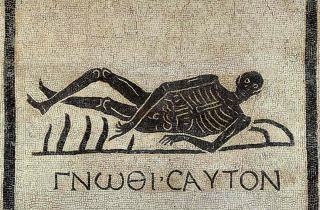
Career
Psychology: It All Makes Sense, If You Think About It
There is nothing in psychology a college freshman doesn't already know.
Posted July 1, 2012
"And so, if your heart is racing when you meet someone, you might mistake it for attraction - which makes sense, if you think about it."

Thinking graduate
So ended the lesson on misattribution of arousal, emphasizing the famous study by Dutton and Aron (1974). I had heard similar things said before, but this time it started to bug me. As I continued observations for the next hour, the lecturer revealed several other findings of social psychology to be obvious. The original authors, I suspect, would have been surprised to know that their results simply "made sense," especially given the criticism they received at the time from leading authorities. I began to wonder if I could have visited the class a month sooner to catch a lecture explaining how hindsight bias makes sense, if you think about it.
No wonder psychology's public image is such a mess. Even though most instructors are probably not this blunt, there is still the temptation to instruct students to rely on their intuitions. If the instructors do not go this way, a new generation of increasingly collegial textbooks do it for them. How can a student avoid the impression that Psychology is a leisurely pursuit? We play up intuitive results, and don't bother to explain how our current intuition is the result of careful and systematic work in generations past. Even the discussion of Freudian psychology goes like this. Whatever you think of Freud's theories, he spent a lifetime developing and refining ideas that were steadfastly rejected when he first began. Sure, it seems intuitive now, but that is because Freud came to America 100 years ago.
This same attitude also interferes with our ability to talk meaningfully about ethics and morality in psychology. Take, for example, one of the morals to come out of Deborah Blum's Love at Goon Park, which discusses Harry Harlow's life and work. Harlow's studies of early deprivation are often held up as key examples of why we need more regulations regarding animal experimentation. But the evidence needed to support that argument wouldn't have been present if Harlow hadn't done his research (at least the initial experiments). The results were startling to many at the time. If the massive problems with Romanian orphans are any indication, there are quite a few people who could still learn a lot from Harlow's studies. Further, related studies rearing monkeys with surrogate mothers (such as dogs) reveal that monkeys are much more resilient than the current narrative suggests. We cannot begin to meaningfully discuss the moral and ethical implications of this research if we do not admit as a starting point that the outcome was not predictable.
The worst offender on this point, which starts out far too many Intro textbooks, sounds something like this: "You have had minds your whole life, so you know how minds work." Having surveyed many classes, I can assure you that most students find this argument quite convincing. Oddly, they do not think the same logic applies to other fields. I point out that they have had digestive systems their entire lives, and ask how many know how digestion works. Only a few raise their hands. I point out that they have been made of subatomic particles their entire lives, and ask how many know how subatomic physics works. This time none raise their hands. Why is Psychology different?
I could pretend to be hip by blaming Descartes, or something like that. But I'll get to him in later posts. Instead I'll pretend to be hip by blaming it on a lack of attention to the Oracle of Delphi. Many things were carved at the entrance to the temple where the Oracle gave her prophecies, but the most famous said "Know Thyself". There are many ways in which this phrase has been interpreted, each with its own moral. However, there is pretty universal agreement that the moral includes this: Knowing yourself is hard.

Mosaic "Know Thyself"
Barring some of the older students, some of the veterans, and maybe the very rare overachiever, most students in Introductory Psychology have no clue who they are. Some might have had a good handle on who they were, say in high school. But most have no idea, during the first few weeks as freshmen, who they are as college students, nevertheless as adults. Time was when a boy would go off to war to find out if he was brave. Of course most of the boys thought they were brave, but they knew they could not be certain until they faced danger and either stood their ground or ran away. Telling students that they already know who they are is a disservice.
No student starting to learn about physics or chemistry expects to come out with pretty much the same understanding of the world they started with. Why should students of psychology expect to come out with pretty much the same understanding of minds that they started with? My suspicion is that most psychology students start out expecting to learn things they don't already know, and they would be happy to be faced with unintuitive results (though not too many all at once). Instead, we give them books, and sometimes lectures, that assure them that they know most of it already. Uhg!
Psychology is complex and hard. There are good reasons why psychologists do research. To become a psychologist, you need to learn many, many things that are initially unintuitive. You also need to appreciate that different ways of determining the truth about psychological phenomenon have different virtues. We should avoid, as much as possible, implying that the findings of our field are obvious, or that they were easily wrought.
The more we work to present our field as full of obvious results, the more we undermine the chances of gaining broad societal support and respect. That is just common sense, if you think about it.

